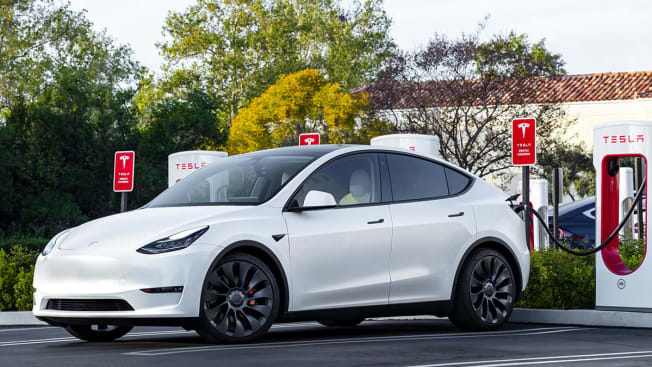Why Leasing an Electric Car Is a Better Deal
Even the priciest Tesla will qualify for a tax credit if you lease it—and you won’t get stuck with yesterday’s technology

If you’re considering an electric vehicle, you should think about leasing instead of buying. Although the market for EVs is changing rapidly and unpredictably, leasing offers some advantages.
• You can qualify for a full $7,500 federal tax credit without meeting restrictive federal requirements on where an electric car was made, how much it costs, or how much a lessee makes.
• Because you only lease for a few years, you won’t be stuck with a car that has outdated battery technology or charging standards, as these are still rapidly evolving.
• If an automaker drops the price of a new EV by thousands of dollars overnight—as Ford recently did on the F-150 Lightning—you won’t take the hit if your leased vehicle is suddenly worth less than it was the day before.
Here, we’ll address some common topics, including:
• What Is Leasing?
• Can You Get a Tax Credit If You Lease an EV?
• When It’s Better to Buy or Finance a Car
• Which Automakers Offer the Best Lease Deals on EVs?
• Can You Negotiate the Price of a Lease?
• Should You Buy Your EV at the End of a Lease?
• When It’s Better to Lease a Car
Ultimately, EV technology is still evolving, and leasing can insulate buyers from some pitfalls they may face, says Jake Fisher, senior director of auto testing at Consumer Reports.
“As the EV market continues to quickly change, it may be difficult to predict what used ones may be worth down the road,” he says. “Leasing an EV is a great way to essentially lock in the resale value.”
What Is Leasing?
With a lease, you make a monthly payment to a leasing company in order to drive a new car for a set number of months—usually 18 to 36—and for a set number of miles. The payment is essentially the amount the car is expected to depreciate during the lease period.
Can You Get a Tax Credit If You Lease an EV?
Yes. New federal rules make EVs eligible for a federal tax credit of up to $7,500. But for purchases, both the car and the buyer are subject to numerous conditions: The vehicle has to be made in North America, its battery components and minerals must meet specific sourcing requirements, it must be priced under a certain threshold, and the buyer’s income must not exceed a certain amount. That’s why only a few EVs qualify.
But those conditions all get thrown out the window if you lease, regardless of how much it costs, where it was made, or how much you earn. “A lease is considered a commercial sale to the leasing company and is eligible for a separate commercial vehicle tax credit that has fewer restrictions than the consumer tax credit,” says Chris Harto, CR’s senior energy policy analyst. That means the leasing company can get a full $7,500 tax credit for an EV, and in turn pass some or all of those savings on to you in the form of lower lease payments. (Leasing also lets you enjoy those savings even if you don’t owe a tax burden at the end of the year.)
Some leased EVs may also be eligible for state and local savings, or even rebates from electric companies. Check out CR’s Electric Vehicle Savings Finder to learn more.
When It’s Better to Buy or Finance a Car
In spite of all of the advantages of leasing, there are some reasons that buying or financing your next EV could be the better move.
It’s hard to walk away from a lease. Most important for EV owners, it’s difficult to terminate a lease if you decide that you don’t like the car, or if your lifestyle changes and an EV no longer meets your needs. You’ll probably get stuck with thousands of dollars in early termination fees and penalties if you get out of a lease early—and they’ll all be due at once. Those charges could equal the amount of the lease for its entire term.
You’ll have equity in a car you own. At the end of the lease, you have no equity in the car—nothing to show for the payments you’ve made. If you choose to lease another car, the payments start up again. If you don’t, you may have to pay a disposition fee that’s typically a few hundred dollars.
There are no mileage limits. If you go over your lease’s mileage limit—typically between 10,000 and 12,000 miles per year—you’ll have to pay an excess mileage penalty. That can range from 10 cents to as much as 50 cents for every additional mile. You don’t get a credit for unused miles.
You won’t incur extra fees and charges. If you don’t maintain a leased vehicle in good condition, you’ll have to pay excess wear-and-tear charges to repair the dings and scrapes or remove any aftermarket accessories when you turn it in.
Which Automakers Offer the Best Lease Deals on EVs?
Hyundai, Lucid, and Polestar are among the automakers announcing in advertisements that they’re including the tax credit in lease deals. Hyundai calls it an “EV Lease Bonus,” Polestar calls it a “Polestar Clean Vehicle Noncash Credit,” and Lucid calls it “Plug-In Electric Vehicle Savings.” These deals can reduce the cost of a vehicle and lower the monthly payment or down payment you have to make.
Can You Negotiate the Price of a Lease?
Dealerships don’t necessarily have to honor advertised lease deals, says Gabe Shenhar, associate director of CR’s auto test center. “Leases are negotiable because dealers compete among themselves,” he says.
For example, the decision to include the tax credit in your lease (and to sell you the car without first inflating the manufacturer’s suggested retail price with dealer fees or other markups) is ultimately up to the dealership. For example, the Chevrolet Bolt is eligible for a $7,500 tax credit, but dealerships are marking up the MSRP by 14 percent, on average, as of July 2023 according to data from TrueCar—eliminating much of the savings.
To avoid confusion and to be certain you’re getting the full savings, ask to see where the credit is factored in on your paperwork, and check to make sure the original sale price isn’t marked up to compensate for it. Ask about every line item on the paperwork. “Buyers can be too focused on the monthly payment and not realize they’re leaving money on the table if the dealer starts off with a markup or eliminates discounts the vehicle may be eligible for,” Shenhar says.
Should You Buy Your EV at the End of a Lease?
That depends. Almost all lease contracts have what’s called a buyout amount or payoff amount, a dollar value that you can pay the leasing company to purchase the car outright. You can negotiate this number, but only before a lease is signed. Leasing companies hope that it will accurately reflect what a car is worth at the end of a lease, but they could get it wrong.
If demand for used EVs is high at the end of your lease, resale values may be higher than expected and it may make sense to purchase the car for the buyout value that’s written into the lease contract. “If the automaker underestimates the resale value, you can buy the car and have equity, or sell it for a profit,” Fisher says. That’s what many lessees were able to do when used-car values soared early during the pandemic. But if similar cars are selling for less than the buyout amount written into your lease—or if the new crop of EVs are better than the leased one you’re turning in—it’s smart to walk away.
When It’s Better to Lease a Car
In addition to cost savings and less restrictive tax credits, leasing might offer other advantages over purchasing an EV.
You won’t get stuck with old technology. EV technology is advancing so rapidly that battery range can increase and purchase prices may drop over a relatively short period of time, Harto says.
Repair costs are lower over time. Whether gas or electric, most all-new models get more reliable after their first year, and that’s no different for EVs. Many of the latest crop of EVs have shown below-average reliability in their first year or so of manufacture. But if you lease, your car will likely be under warranty for the entire time you’re driving it, so fixing any unexpected issues won’t cost you any. In addition, most EV batteries are warrantied for at least eight years or 100,000 miles, so that important component will be covered as well.
You’ll enjoy peace of mind. It’s difficult to predict now how much an EV purchased today will be worth in two, three, or five years, Fisher says. “Prices and rebates have been fluctuating quite widely, making resale values impossible to predict,” he says. If the EV you’re leasing depreciates a lot over the next few years, it’s not your problem.
For example, Ford dropped the price of some F-150 Lightning models by around $9,000 in July. If you purchased one before the price drop, your car just took a bigger depreciation hit than most used cars do.
You’ll have more ways to charge. Another concern is the current divide between Tesla and non-Tesla public charging stations. For years, Tesla’s extensive network of fast Superchargers has been off-limits to drivers of electric vehicles from other brands. But Ford, GM, Nissan, Mercedes-Benz, Polestar, Rivian, and Volvo recently announced that owners of their electric cars will be able to use 12,000 Superchargers beginning next year and that many of their vehicles will come standard with a built-in Tesla-style charger starting in 2025. In addition, competing public charging companies such as Electrify America are planning to also offer Tesla-style chargers. Leasing an EV will let you sit on the sidelines until a winning plug style is crowned—or at least until the network of public charging stations gets bigger.
















